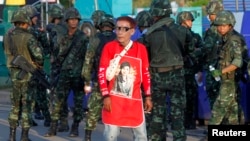Increasingly violent protests that now define Thailand's political gridlock first erupted in 2008, when conservative, urban elites known as "Yellow Shirts" campaigned to oust a government led by so-called "Red Shirt" allies of ousted Prime Minister Thaksin Shinawatra.
That year, two successive pro-Thaksin prime ministers were removed from office by Thai courts over election law challenges. Those ousters allowed the Senate to appoint Oxford-educated Prime Minister Abhisit Vejjajiva, a pro-Yellow Shirt Democrat.
The Abhisit government struggled to cope with the global economic crisis of 2008 and 2009, and faced major protests by Red Shirt Thaksin supporters in 2010 that led to nearly 100 deaths in Bangkok. The prime minister resigned a year later, setting the stage for the landslide election win of Thaksin's sister, Red Shirt ally Yingluck Shinawatra.
Thai courts removed Yingluck from office earlier this month on corruption charges.
The roots of the Red Shirt movement are found in the 2001 election of Thaksin, a billionaire telecom tycoon who led the government until 2006, when he was ousted in a military coup. He was later convicted of corruption charges and went into self-imposed exile in Dubai.
Thaksin maintains enormous popularity among the urban working class and rural farmers of northern Thailand for initiating drastic improvements in health care, education and rural financing during his tenure.
That year, two successive pro-Thaksin prime ministers were removed from office by Thai courts over election law challenges. Those ousters allowed the Senate to appoint Oxford-educated Prime Minister Abhisit Vejjajiva, a pro-Yellow Shirt Democrat.
The Abhisit government struggled to cope with the global economic crisis of 2008 and 2009, and faced major protests by Red Shirt Thaksin supporters in 2010 that led to nearly 100 deaths in Bangkok. The prime minister resigned a year later, setting the stage for the landslide election win of Thaksin's sister, Red Shirt ally Yingluck Shinawatra.
Thai courts removed Yingluck from office earlier this month on corruption charges.
The roots of the Red Shirt movement are found in the 2001 election of Thaksin, a billionaire telecom tycoon who led the government until 2006, when he was ousted in a military coup. He was later convicted of corruption charges and went into self-imposed exile in Dubai.
Thaksin maintains enormous popularity among the urban working class and rural farmers of northern Thailand for initiating drastic improvements in health care, education and rural financing during his tenure.





